Theme
The Spaniards who have emigrated to other countries since the economic crisis have done so under worse conditions than other recent emigrants from the rest of Southern Europe.
Summary
This paper compares the situation of Spanish skilled emigrants –based on the results from the first European survey on the issue– with that of the Greeks, Italians and Portuguese. Although unemployment and the risk of poverty among Spanish university graduates has been higher than the average for other national groups since the economic crisis, the Spanish took longer to emigrate than other Southern Europeans. Spanish emigrants have also enjoyed less secure positions in their destination countries, suffering higher unemployment and lower average salaries than their European counterparts. They have faced greater life difficulties, partly because they left in more precarious conditions, but also because their command of the local language is weaker. Furthermore, because only 36% of Spanish emigrants register at their consulates in destination countries, this analysis estimates that the total number of Spanish emigrants is nearly three times the official statistic.
Analysis1
Introduction
The economic crisis since 2008 has had a much greater impact on Southern Europe than on other parts of the continent, prompting a noticeable increase in both unemployment and economic emigration. This has given rise to a new wave of internal migration within the EU from the South to the North, and a further external movement of emigrants to the Americas and other continents.
Within this context, and at the worst moment of the crisis, four institutions from Italy, Ireland, Portugal and Spain cooperated to undertake the survey ‘Emigrating in times of crisis’.2 The survey’s data allows, for the first time, a comparison between the experience of recent Spanish emigration and that from other Southern European countries. The study focused on five groups of international emigrants: Italians, Greeks, Portuguese, Irish and Spaniards. These have been the most affected by the economic crisis that began in 2008 in terms of unemployment and state budget cuts. The questionnaire –prepared in five languages and accessible online through the Survey Monkey program– ran for three months (from 21 May to 18 August 2013) and received a total of 6,750 valid responses (1,543 of which were Spanish). The questions focused on different aspects of the migrant experience: the emigrant’s situation in the country of origin, the reasons for leaving and the difficulties encountered in the destination country, including employment and income situation. In this paper, the data for Irish emigrants has been excluded in order to focus on the more homogenous group of Southern Europeans.
The first problem facing researchers attempting to analyse the characteristics of recent Spanish emigration is the absence of sufficient statistical information. For this reason, all the quantitative studies that have been undertaken have employed survey techniques relying on ‘snowball samples’ which use Internet and social media to conduct the survey (either physically or electronically), to publicise it and to contact with more emigrants.
The survey ‘Emigrating in times of crisis’ excludes individuals who emigrated before 2007, along with those who are not native Spaniards, Greeks, Italians or Portuguese, and those with less than university education.3 With these restrictions, the sample number to be analysed was limited to 4,058 individuals (982 of which were Spanish).
A late emigration
One important conclusion derived from the comparison between the four countries of the sample is that Spanish emigration occurred later than the others –despite the fact that the economic crisis began in Spain earlier, as a result of the end of the property boom in 2007–. The data presented in the following graph is derived from the survey and is consistent with the evolution of departures documented by the National Institute of Statistics (INE) in which a significant increase in emigration is registered in 2012. The comparison with the rates of departure among those interviewed from the other three countries of the region reveals that the rate of Spanish emigrants leaving Spain was below that of the other countries until the second half of 2010 and began to overtake them in 2011.
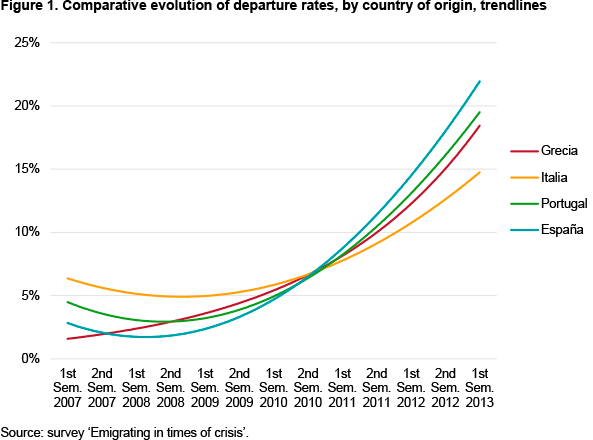
Comparing the evolution of departure rates with the changes in the unemployment rate among university graduates in the four countries, the divergence between them becomes apparent: the unemployment rate of Spanish university graduates is, together with the Greek, the highest in the group since 2008.
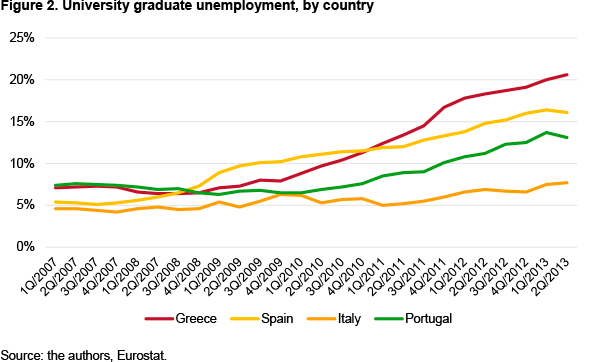
On the other hand, the high Spanish unemployment rate is not offset by a sufficient state protection that could, in theory, mitigate the consequences of unemployment on the well-being of such individuals. Data from Eurostat shows that the percentage of the population with a university education at risk of poverty (with a disposable income below 60% of the median) was highest in Spain during the period examined. From this comparison it follows that there are factors other than employment or income that have limited the departure of native Spaniards as emigrants.
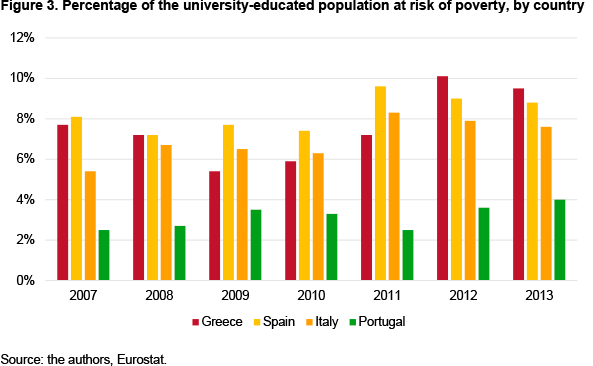
More motivated by unemployment
The higher weight of unemployment as a cause of emigration in the case of Spaniards appears clearly in the responses of emigrants to the direct multiple-choice question as to their main reasons for emigrating. In contrast, the desire to improve levels of education and skills, to try new experiences, to advance professionally or raise income prospects, or to find new business opportunities, were less important factors for Spanish emigrants than for those from any of the other countries.
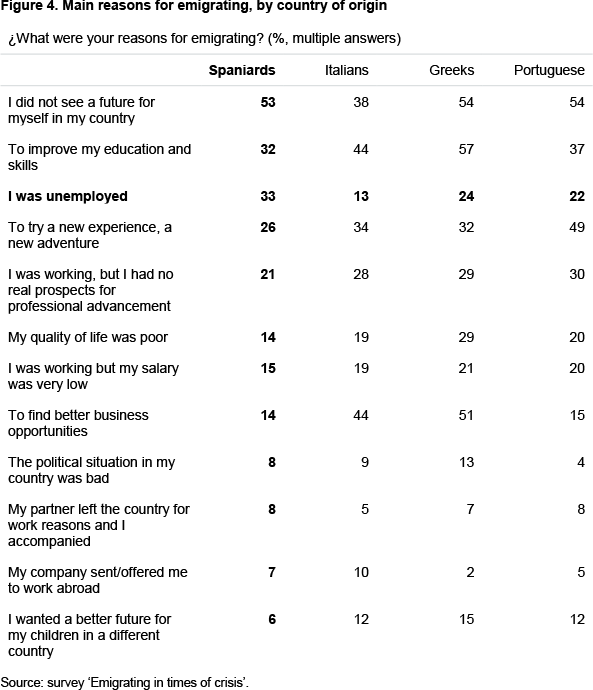
Before deciding to emigrate, Spaniards were much more frequently unemployed than the other emigrants in the sample (48% versus an average of 39% in the three other countries). Because the Spanish emigrant’s mobility is most frequently induced by unemployment, the emigrant project tends to be undertaken with less preparation and inferior negotiating power. Furthermore, as will be shown below, the success of the Spanish emigrant project is lower than those from the other countries of Southern Europe, both in terms of the type of labour situation secured and the levels of income obtained.
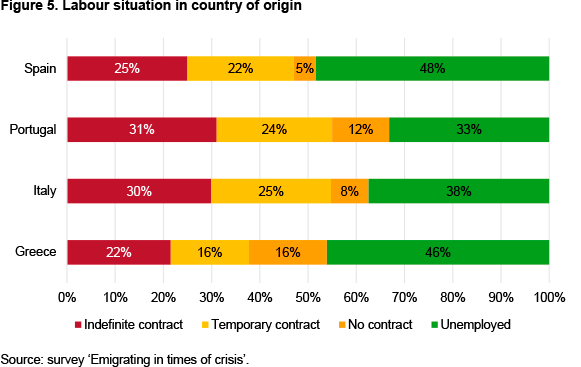
Although unemployment is a stronger factor in Spain as a reason for emigrating than in the other countries of the group, unemployment is not –according to the explanation of their own experience by those surveyed– the most cited reason in Spain or any of the other three countries. This result also coincides with the studies undertaken on Spanish emigrants by the International Organisation for Migration and the University Institute for Migration Studies.4 The protagonists of recent skilled emigration from Southern Europe explain their decision above all as the result of a general lack of prospects. As Shown in Figure 4, the option ‘I did not see a future for myself in my country’ was chosen by 50% on average across four countries, a response that expresses a profound pessimism with respect to possible future developments, and something which has also been documented in the Spanish case by other studies.5
Less successful
Furthermore, a comparison of the survey results reveals that the situation of Spanish emigrants in their destination countries is weaker than that of emigrants from the other countries. On the one hand, the Spanish were unemployed in their destination countries more frequently than the Portuguese or the Italians, and on the same level as the Greeks.
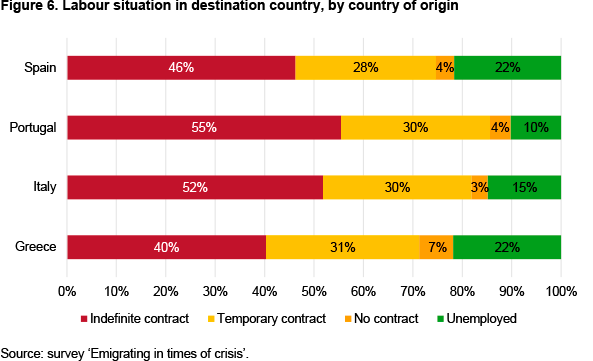
On the other hand, among the emigrants who have gained employment, Spaniards are over-represented in the occupations that require the least amount of education and skills and under-represented among the professions.
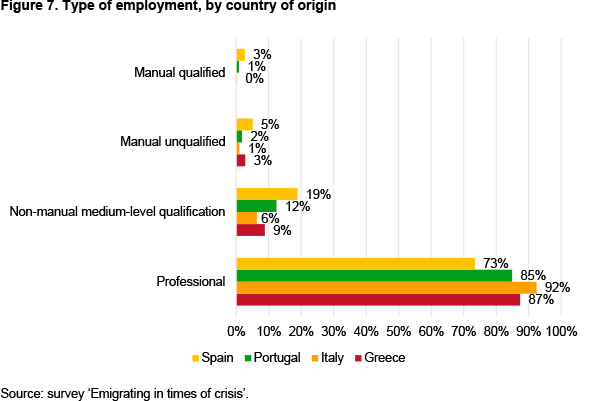
In keeping with this unequal situation in the labour market, the incomes of Spanish emigrants in their destination countries are lower than the average. Their presence is strongest amongst those earning less than €1,000/month and they are also concentrated at the intermediate income levels, between €1,000 and €3,000. But they have very little representation at the highest levels.
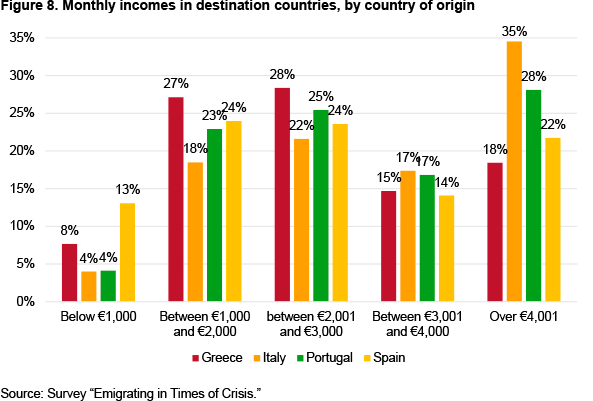
An analysis of the logit correlations allows us to measure the weight of ‘being Spanish’ and of ‘being unemployed before emigrating’ on the employment situation encountered in the destination country.6 The logit model shows that the likelihood of a Spanish emigrant being employed in the destination country is 44% lower than for an emigrant from one of the other three countries. On the other hand, unemployment in the country of origin is a strong predictor of the employment situation in the destination country: if the emigrant was working before emigrating, the likelihood that he is now also employed in the destination country is 70% higher than if he were unemployed in the country of origin before emigrating. Given that Spanish migrants were more frequently unemployed before emigrating than the Greeks, Portuguese or Italians, they are found to be unemployed in destination countries also more frequently than the others.
Lower human capital (language)
One important factor related to the lower success of skilled Spanish emigration is a lack of foreign-language proficiency. More than half of the Spaniards interviewed (55%) point to this as one of the problems encountered in the destination country, compared with only 31% among the Portuguese, 35% among the Italians and 37% among the Greeks. These figures are consistent with the results of the Special Eurobarometer Number 386 (European Commission, 2012), a monograph dedicated to the use of foreign languages in Europe: the Spanish have the lowest level English-language proficiency of any European member of the EU. Only 14% of Spaniards said they know it well enough to have a conversation –less than half the EU average (32%) and far behind the leading countries, such as Sweden (82%) and Denmark (79%)–. The use of German among Spaniards (1%) is also at the bottom levels of the European rankings: the average in the EU is 5%. Only in the case of French, which 4% of Spaniards say they speak well enough ‘to hold a conversation in this language’, is Spain close to the EU27 average (5%), although it remains below Portugal (8%) and Ireland (10%).
In the case of the Spanish, this lower language proficiency in the destination country reduces job opportunities and, in general, makes it more difficult to deal with any procedure, be it the search for lodging, the administrative bureaucracy to acquire official recognition for degrees or to receive medical attention, or any other activity which requires fluency in the local language. Therefore, to the question as to what problems they had encountered in the destination country, Spanish emigrants pointed more often than the other national groups to the difficulties in finding work (25% compared with 14% as an average among the other groups), to secure medical insurance (13% compared with 6%), to rent lodging (34% versus 30%) or to acquire degree recognition (16% compared with 7%); in addition, they received job offers below their level of qualifications 23% of the time, compared with only 7% on average among the other emigrants of the group. Only 17% of Spanish emigrants said they had no difficulties, compared with 30% of the Greeks, 37% of the Italians and 32% of the Portuguese.
Few have registered with their consulates
Although it is legally compulsory to register at a Spanish consulate in the destination country for all those residing for more than three months outside Spain, there are no enforcement mechanisms to either sanction lack of compliance or to provide incentives for its fulfilment, especially with respect to those individuals in the early phase of their emigration experience and who do not yet know how long they will reside in the destination country. Registration at a consulate must be done in person and, in many cases, requires travelling from the place of residence to another city in the country where a Spanish consulate is located. On the other hand, the advantages of registration are scant and since 2013 there has even been a cost: losing access to free public health service in Spain.7
The survey results show that this under-registration is a common problem among the four countries of Southern Europe, and especially in the Greek case: only one in every seven emigrants from the country has registered abroad. In the Spanish case, only 36% of those who have emigrated since 2007 were registered at the time of the survey. From this figure it follows that one would have to multiply by 2.7 the number of those who have registered to obtain an estimate for the real number of native Spanish emigrants abroad.

The likelihood of registering rises with an emigrant’s length of stay: among the Spanish who emigrated before 2007, 78% were registered, but only 26% of those who emigrated during 2012 had registered. This suggests a pattern of behaviour in which the emigrant only goes to a consulate once emigration is firm.
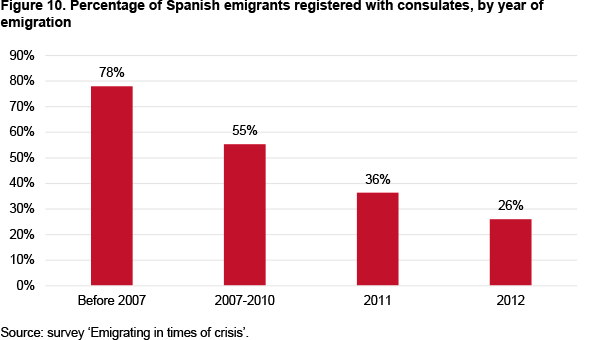
Source: survey ‘Emigrating in times of crisis’.8
On the other hand, together with the length of stay, the specific destination country is the other discriminating factor: the likelihood of an emigrant registering at a consulate in an EU destination country is lower than for emigrants to any other (non-EU) region of the world.
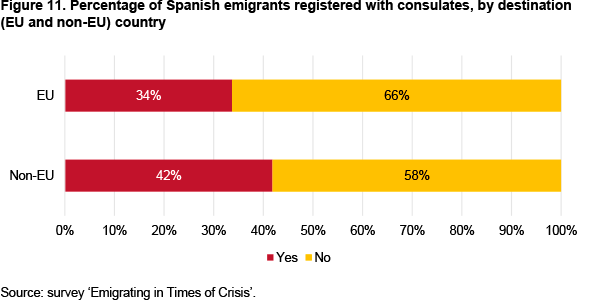
When considering the motives for not registering with a consulate, the perception that registration is not useful and is not worth the cost (time, travel, paperwork, etc) stands out as a dominant reason. The legal aspect (it is obligatory to register) barely carries any weight in the decision. This suggests that under-registration will continue to be usual in the future unless the required procedure is made far easier (for instance, by providing an online registration option) and positive incentives are provided.
Conclusions
The effect of the economic crisis on the emigration of university graduates has been felt later in Spain than in the other countries of Southern Europe, even though the impact of the crisis on the unemployment rate and on the percentage of university graduates at risk of poverty has been sharp and fast. Since 2008 unemployment among university graduates in Spain and Greece has been the highest in the EU and Spain heads the ranking of the percentage of university graduates at risk of poverty. On the other hand, Spain shares with Italy, Greece and Portugal the same kind of Mediterranean ‘welfare state’ in which the family plays an important role in complementing state-provided services. As a result, the additional family protection cannot explain the differences in the behaviour of Spanish emigrants.
The Spanish waited longer to emigrate than other Southern Europeans; they started out unemployed in their own country more frequently than the others, and their reasons for emigrating were based less on life strategies to improve their skills or professional prospects than on the imperative to find work. This seems to indicate that there are other non-economic factors in Spain –stemming from an aversion to geographic mobility– which influence decisions on whether or not to emigrate.
Because of this more notable resistance to geographic mobility, Spanish emigrants have left their own country in more vulnerable conditions and with less negotiating power. Their integration in their destination countries is less successful in terms of employment and income, and their life experience presents more difficulties. Another influential factor is related to human capital and foreign-language proficiency. This factor works against emigrants from Spain since, like the rest of the Spaniards, they have a deficit in this area that places them in a weaker position in the labour market of their destination countries.
Carmen González Enríquez
Senior Analyst, Elcano Royal Institute | @rielcano
José Pablo Martínez Romera
Research Assistant, Elcano Royal Institute | @jpmromera
1 The publication Migraciones devoted its latest issue (number 43) to recent Spanish emigration. The issue also included a longer version of the study presented in this paper.
2 The survey was undertaken by the European University Institute (Florence), the University Institute and University of Lisbon, Trinity College Dublin and the Elcano Royal Institute (Madrid).
3 One common result of the surveys undertaken to date concerns the level of university education among the new emigrants. Those with less education are very few: between 4% and 15% in the different surveys. In the survey ‘Emigrating in times of crisis’ only 11% of those interviewed had less than a university education.
4 Rosa Aparicio (2014), ‘Aproximación a la situación de los españoles emigrados: realidad, proyecto, dificultades y retos’, International Organisation for Migration, Madrid; and Raquel Caro & Mercedes Fernández (2015), ‘Perfiles y características de los nuevos emigrantes españoles’, Informe OBIMID October, Observatorio Iberoamericano sobre Movilidad Humana, Migraciones y Desarrollo, Universidad Pontificia de Comillas, Madrid.
5 Josefina Domínguez-Mujica, Ramón Díaz-Hernández & Juan Parreño-Castellano (2016), ‘Migrating abroad to get ahead: the emigration of young Spanish adults during the financial crisis (2008-2013)’, Global Change and Human Mobility, Springer, Singapore, p. 202-223; and Pablo Pumares & Beatriz González (2016), ‘Movilidad, migración y retorno de jóvenes españoles en el Reino Unido’, Actas del XV Congreso de la Población Española, Universidad de Las Palmas de Gran Canaria, p. 275-309.
6 The results of the correlations analysis can be seen in the article ‘La emigración española cualificada tras la crisis. Una comparación con la italiana, griega y portuguesa’, in issue nr 43 (2017) of the publication Migraciones.
7 Law 22/2013, of December 23, General Budget of the State for 2014.
8 These figures also include those for emigration prior to 2007 to show how length of residence in a destination country decisively influences consular registration; however, they exclude data from 2013 because many of the arrivals in that year had spent less than three months in their destination countries when the survey was undertaken, and they were still not obliged legally to register.



